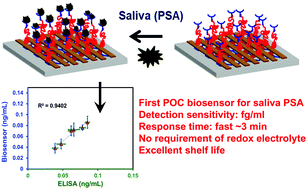Detection of prostate specific antigen (PSA) in human saliva using an ultra-sensitive nanocomposite of graphene nanoplatelets with diblock-co-polymers and Au electrodes†
Abstract
Prostate-specific antigen (PSA) is a commonly used biomarker for the detection of prostate cancer (PCa) and there are numerous data available for its invasive detection in the serum and whole blood. In this work, an electrochemical sensing method was devised to detect traces of PSA in human saliva using a hybrid nanocomposite of graphene nanoplatelets with diblock co-polymers and Au electrodes (GRP-PS67-b-PAA27-Au). The pure graphitic composition on filter paper provides significantly high electrical and thermal conductivity while PS67-b-PAA27 makes an amphiphilic bridge between GRP units. The sensor utilizes the binding of an anti-PSA antibody with an antigen-PSA to act as a resistor in a circuit providing an impedance change that in turn allows for the detection and quantification of PSA in saliva samples. A miniaturized electrical impedance analyzer was interfaced with a sensor chip and the data were recorded in real-time using a Bluetooth-enabled module. This fully integrated and optimized sensing device exhibited a wide PSA range of detection from 0.1 pg mL−1 to 100 ng mL−1 (R2 = 0.963) with a lower limit of detection of 40 fg mL−1. The performance of the biosensor chip was validated with an enzyme-linked immunosorbent assay technique with a regression coefficient as high as 0.940. The advantages of the newly developed saliva-PSA electrical biosensor over previously reported serum-PSA electrochemical biosensors include a faster response time (3–5 min) to achieve a stable electrical signal for PSA detection, high selectivity, improved sensitivity, no additional requirement of a redox electrolyte for electron exchange and excellent shelf life. The presented sensor is aimed for clinical commercialization to detect PSA in human saliva.

- This article is part of the themed collection: Bioanalytical Sensors


 Please wait while we load your content...
Please wait while we load your content...